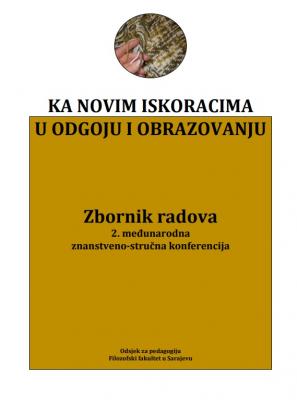EFIKASNOST AKADEMSKOG ANGAŽMANA STUDENATA – ULOGA POJEDINIH PSIHOSOCIJALNIH FAKTORA
EFFICIENCY OF ACADEMIC ENGAGEMENT OF STUDENTS – THE ROLE OF SOME PSYCHOSOCIAL FACTORS
Author(s): Amela Dautbegović, Sibela Zvizdić MecoSubject(s): Higher Education , Educational Psychology, Developmental Psychology, Pedagogy
Published by: Filozofski fakultet Univerziteta u Sarajevu
Keywords: academic adaptation; efficiency of academic engagement; organization of the work at studies; time pressure and stress;
Summary/Abstract: Academic adaptation reflects the degree to which students have adapted to academic requirements, which is reflected in their attitudes towards studies, engagement and effort invested. Efficiency of academic engagement represents one aspect of academic adaptation of students, and refers to the engagement and motivation for the implementation of student assignments. Within the conducted research relationship between individual psychosocial factors (gender, academic year, high school achievement, parent education level, self-efficacy, self-esteem, locus of control, optimism, work organization, perceived social support by family, friends and other significant persons and time pressure and stress) and the effectiveness of academic engagement were examined. N=650 students of the first, second and third year of the first cycle of studies from the four faculties of the University of Sarajevo participated in the study. The following instruments were applied: General Self-Efficacy Scale (Schwarzer et al., 1997), Rosenberg Self-Esteem Scale (1965), Externality Scale (Bezinović, 1990), Optimism Scale (Penezić, 1999), Multidimensional Scale of Perceived Social Support (Zimet et al., 1988), The Inventory of Parent and Peer Attachment (Armsden and Greenberg, 1987), Work Organisation at Studies Scale (Dautbegović and Zvizdić, 2015), Time Pressure and Stress Assessment Scale (Dautbegović and Zvizdić, 2015), Student Adaptation to College scale – Efficiency of Academic Engagement Subscale (Baker and Syrik, 1984) and Questionnaire of socio-demographic features designed for the purpose of this research. A complete regression analysis was conducted, and the obtained results indicate that four predictor variables (work organization, time pressure and stress, self-esteem and gender) together explain 30% of the variance of the criterion measure called efficiency of academic engagement. Multiple correlation coefficient between all predictor variables and criteria is .548 (F=17.920; p=.00). The organization of the work at studies is set as the predictor with the greatest contribution in explaining the criterion of efficiency of academic engagement (β=.396; p=.000).
Journal: Zbornik radova Odsjeka za pedagogiju
- Issue Year: 2/2018
- Issue No: 2
- Page Range: 26-36
- Page Count: 11
- Language: Bosnian

